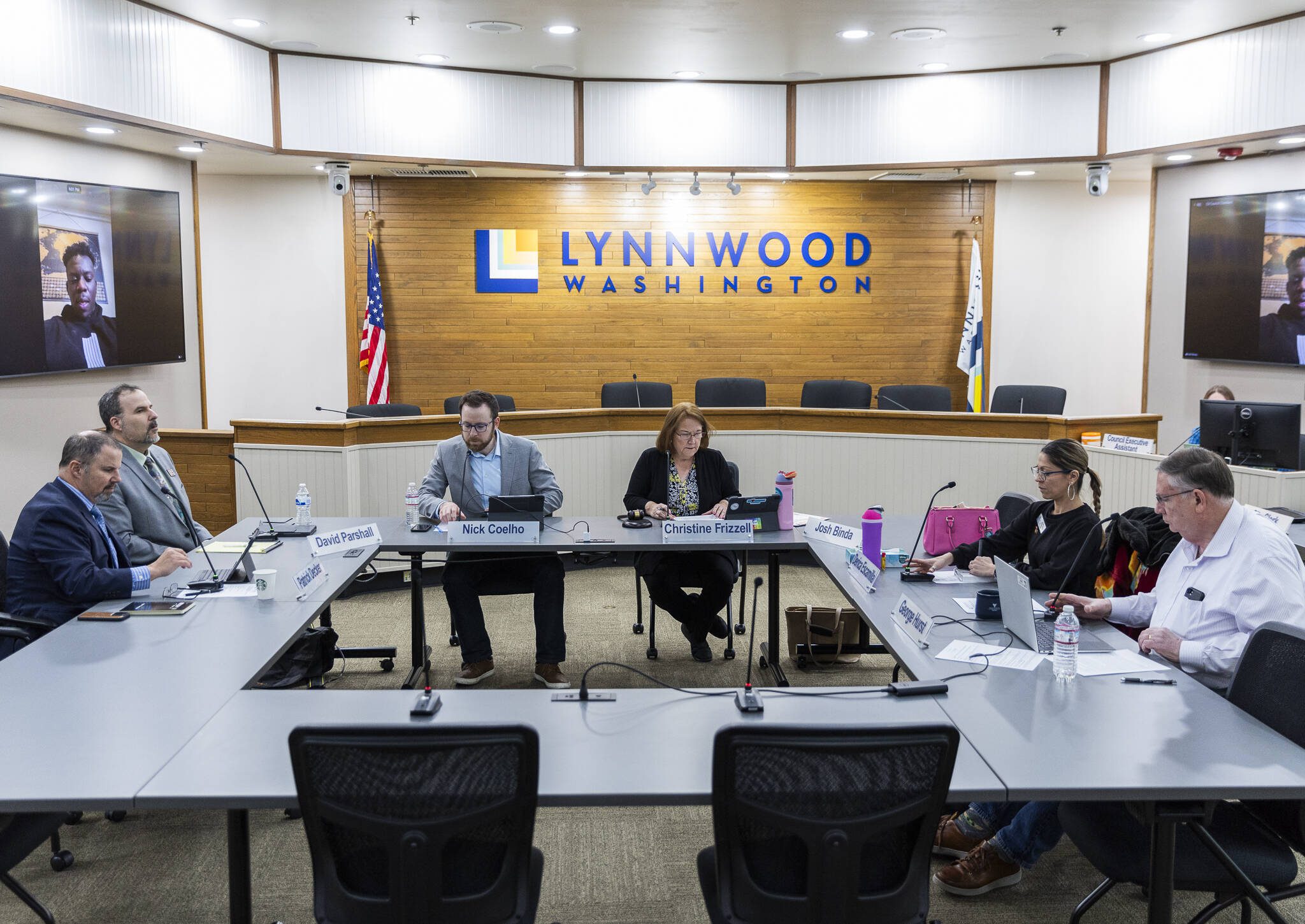LYNNWOOD — The Lynnwood City Council met during its summer recess Wednesday to brainstorm how to move forward in navigating the city’s budget crisis.
The city is on track to face a $10.7 million shortfall by the end of 2026, finance director Michelle Meyer told the council last month. The crisis largely stems from lower-than-expected revenues, mainly from sales tax, development services and red-light cameras.
At a regular business meeting Monday, council member George Hurst made a motion to hold a special meeting during the council’s summer recess, which began Tuesday. He advocated for the council to hold more meetings about the budget crisis and to be included in all future budget decisions.
“This is not a deficit created by the instability of the national economy or a decline in revenue,” Hurst said Wednesday. “It’s because of inaccurate economic forecasts that are embedded in the budget.”
Revenues from the first six months of 2025 were $1.7 million higher than revenues from the first six months of 2024, he said.
On July 29, Lynnwood Mayor Christine Frizzell said the city is considering staff cuts to address its budget challenges. To honor collective bargaining agreements with the city’s unions, the council won’t receive more details about department-specific cuts until Sept. 15, Meyer said Wednesday.
Council members asked each department to bring a detailed, itemized list of cuts and how they would impact residents to the Sept. 15 meeting.
In January, the council approved a schedule for taking action on any changes they wish to make to the budget for 2026. On Nov. 3, the council will hold a work session to discuss any amendments. If the council decides to look into increasing 2026 property taxes, discussions would also begin on Nov. 3. The council would have to take action on amendments and a levy by Nov. 24 to meet the county’s deadline of the end of November.
In December 2024, the city passed a 52% property tax increase — $144 per year for the average homeowner — to fund city positions that were previously funded through one-time COVID-19 relief grants. These included 10 police officers, two parks maintenance staff and a human services coordinator. The increase also went toward several new positions, including many employees at the Community Justice Center.
Without voter approval, the city can raise its property tax levy rate by another $3.6 million. This would raise property taxes for the average homeowner by about $211 per year to a total of $633 per year, Meyer said at a meeting last month.
Council member Patrick Decker said he would be voting against any property tax increases. He cited the budget crisis in Edmonds, which relies on property taxes for about 27% of its revenue.
“South Snohomish County and Washington state generally are proof that you cannot tax your way into prosperity, it does not work,” Decker said.
Council President Nick Coelho proposed ideas for reductions from the City Council’s budget.
“We are talking about pennies compared to the whole problem, so this is a gesture of sorts,” he said. “But I think in a time of pain and of pinching, there’s probably something good to be said about sharing in a little bit of that pain.”
The council has already seen about $21,000 in savings this year from the Position 5 vacancy in the beginning of the year. After former council Vice President Julieta Altamirano-Crosby announced her resignation in January, the position was vacant until the council appointed Robert Leutwyler in March. Coelho also suggested reductions to travel, training, the recently established Youth Council and miscellaneous costs, including food and office supplies.
Through the end of 2026, these savings would total between $50,000 and $60,000, Coelho said. Decker proposed putting the council’s savings toward audits.
“These funds, albeit small compared to the budget, would be sufficient to kick off those audits and get going on that work,” he said. “I think the community is asking us: Where are we spending our money?”
The council continued its discussions about lowering the city’s reserve requirement to two months of operating expenses. Currently, the city is required to have 2.5 months of operating expenses in its reserves. Changing the requirement would decrease the 2025 shortfall by $2.6 million for 2025 and $2.8 million for 2026, Meyer said.
The council’s next meeting after its summer recess is scheduled for Sept. 8.
Jenna Peterson: 425-339-3486; jenna.peterson@heraldnet.com; X: @jennarpetersonn.
Talk to us
> Give us your news tips.
> Send us a letter to the editor.
> More Herald contact information.

























